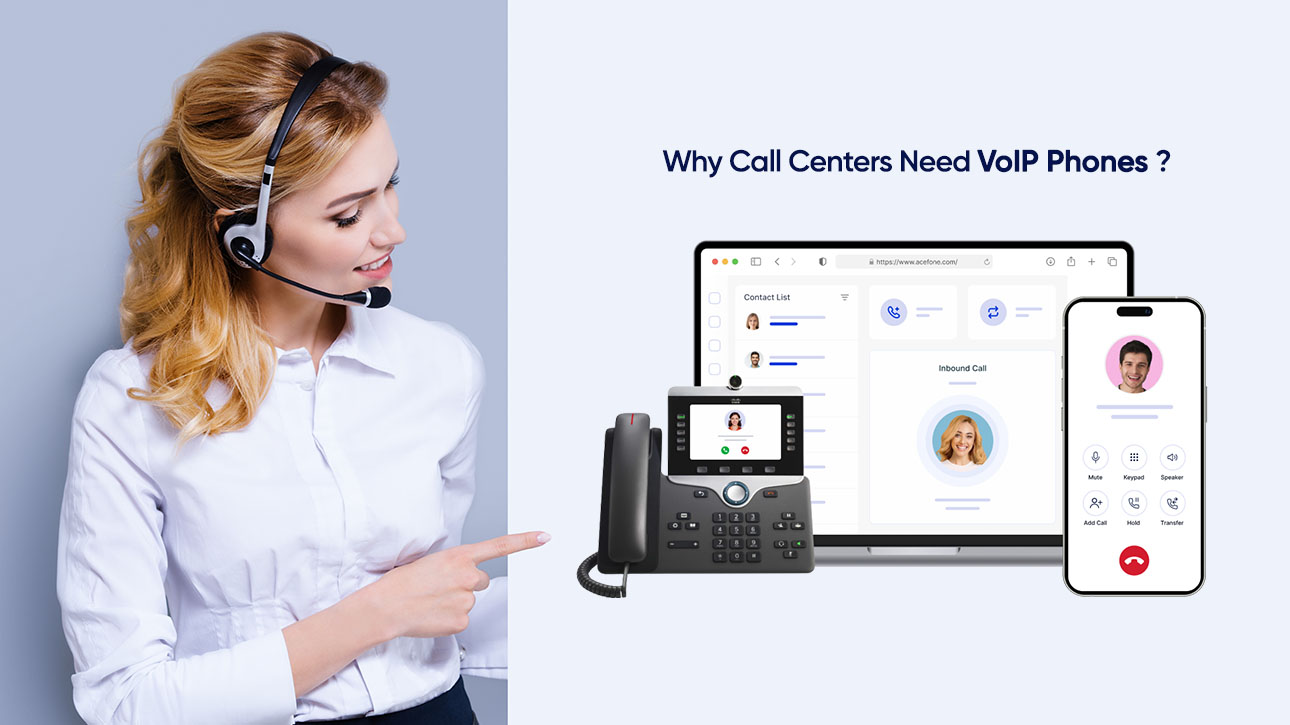Whether it’s finance or healthcare, call centers have spread their branches into every industry and region.
Why?
Meeting customer expectations has become inevitable for a business’s survival today.
Call centers help fasten customer interactions and equip agents with the necessary information to meet their expectations. To ensure they’re getting the most out of their customer interactions, most call centers now rely on VoIP phone system.
While VoIP phone systems continue to gain popularity, there are businesses still relying on traditional PBX for communication. If you’re still one of them, this article is for you.
Read on to learn why call centers find VoIP phone systems crucial for their survival.
What is a VoIP Phone System?
A VoIP phone system is a cloud hosted phone service that allows communication using VoIP technology. Unlike traditional phones, VoIP phones don’t require physical lines to make calls and users can access them on their computers and smartphones via VoIP applications.
How do VoIP Phones Work?
Every time you initiate a VoIP call, a connection request is created through the internet for the receiving party. Once connected, the caller begins speaking their message and the mic converts their voice into digital signals for transmission.
The VoIP system converts the voice into digital signals and prepares them for transportation. To transmit the digital signals, the VoIP system chops them into small packets using the Analogue-to-Digital Converter (ADC). Chopping the signals into small data packets prioritizes their transfer over other data, resulting in crystal clear calls.
On the other end, the VoIP phone’s Digital-to-Analogue (DAC) Converter transforms those data packets back to voice signals, which are then played over the speaker.
Read in depth about VoIP phone services, how they work and more.
Why are VoIP phone systems Important for Call Centers

Efficiently managing call centers can be a complex task with traditional phone systems as they often come with limitations. This is where Voice over Internet Protocol (VoIP) phone systems come into play. They offer a diverse set of features and streamlined communication, making them ideal for call center operations.
Beyond this, there are some well-known advantages that make VoIP phone systems so important for call centers. Let’s check them out.
Cost Savings
Studies show that businesses save an average of 30-50% on communication expenses after switching to VoIP phone services. As opposed to hardwired phone lines used by traditional phone systems, VoIP systems utilize your existing internet connection to transfer the voice calls.
As a result, the call charges are significantly low compared to regular cellular calling. VoIP calls remain the most cost-effective communication channel when compared to WiFi calling, even though both methods use the internet as their calling medium.
Work Flexibility
In the pursuit of enhancing customer experience, businesses are also looking into improving employee experience. With remote work at its boom, companies find work from home more productive and preferable by call center agents. VoIP allows agents to maintain calling continuity as they only require a desktop or their smartphones.
This work flexibility has further benefitted businesses, such as:
- Building diverse teams from different time zones and languages.
- Enhanced employee satisfaction due to flexible work location and hours.
- Easy data recovery from cloud storage during power outages or natural disasters.
Diverse Features
VoIP phone systems have loads of advanced telephony features that streamline call center operations. From initiating calls to tracking department progress, VoIP has a feature to smoothen many other processes.
Some of the most popular VoIP phone features call centers utilize are:
- Interactive Voice Response (IVR)- An IVR is an in-call menu that plays recorded messages along to help callers navigate to the right department/ agent. It also helps callers seek resolution to basic queries through specified action.
- Voicemail- The voicemail-to-email feature prevents agents from missing out customer queries in case a call drops. It allows callers to record their message, which is then sent to the agent’s inbox via email.
- Call forwarding- A simple yet vital functionality that allows agents to forward calls onto a different number in case their designated business phone number is momentarily unavailable.
- Call transfer- To ensure agents aren’t being overwhelmed by complex cases, VoIP allows agents to transfer an ongoing call to another available agent or a supervisor. The transfer can be either cold or warm based on the interaction’s scenario.
- Call monitoring- It allows supervisors and managers to have an overview of all active calls in one place. They can view the duration, barge-in, or whisper a solution to the agent for prompt support or sale.
- Real Time Reporting- VoIP allows agents and their supervisors to view call data in real time to track progress. They can also generate custom reports on demand for assessments and future references.
Every feature provides a unique capability, assisting call center professionals deliver enhanced customer interactions and reach their goals faster.
Collaboration
Call centers in the early days were merely a collection of silos, with agents interacting with leads individually. The picture today is different, thanks to business VoIP services. VoIP fosters an environment where they can seamlessly collaborate with each other on multiple devices.
Call center agents can transfer calls to other agents, leveraging their expertise for specific cases. Features like three-way calling enable them to pull their supervisors in complex cases for faster query resolution.
Additionally, VoIP phone systems can integrate with customer relationship management (CRM) and helpdesk platforms to share vital data across multiple devices. CRM integrations also allow managers to gain a holistic view of every customer’s interaction history with agents and conduct better assessments.
Agent productivity
With the available functionalities in VoIP phone systems, agents can have more interactions, convert more leads, all without sacrificing their quality. VoIP offers automation to remove any redundancies for agents and lets them focus on priority tasks. Insights and analytics enable supervisors to identify improvement areas and tailor their operations for a higher success rate.
Features like call disposition and sticky agent deliver a smooth experience for both the agent and lead. It lets the lead connect with the same agent they interacted with earlier. Call disposition allows the agent to note down the conversation’s outcome after completing the call for later references.
The Bottom Line
VoIP phones are crucial for the survival and success of inbound call centers. They streamline operations, while enabling agents with advanced functionalities and help deliver a wholesome experience. As the call center industry continues to evolve, leveraging the power of VoIP phones becomes a strategic imperative for the success of your business.
Frequently Asked Questions
Call centers rely on the latest technology to efficiently handle high call volumes, automate tasks, and improve customer services.
VoIP (Voice over Internet Protocol) technology such as VoIP phone systems, contact center solutions, APIs and cloud telephony integrations are commonly used in call centers; Allowing calls to be made faster and smoother over the internet.
The future of call centers likely involves increased automation with AI-powered chatbots and self-service options, alongside human agents for complex issues.
Call centers nowadays use headsets with microphones, computers or laptops, and VoIP phones for communication.
VoIP phone systems are generally easier to maintain than traditional phone systems due to their cloud-based nature and minimal on-site equipment.














